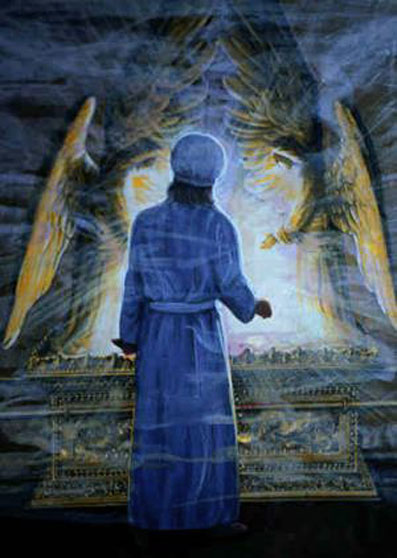Parameters of Cleansing

Bow ties are cool. Fezzes are cool. But systematic typology is very cool. Try this on…

Bow ties are cool. Fezzes are cool. But systematic typology is very cool. Try this on…
The Lord’s name might not be mentioned explicitly in the book of Esther (though some scholars see it hidden in the text), but as literature it is riddled with riffs on the patterns found in the Law and the Prophets. We don’t see it because we don’t interpret “musically,” that is, looking for recurring themes. [1]
“Rivers of water run down from my eyes,
because men do not keep Your law.” Psalm 119:136
I might bag out [1] the Biblical Horizons crowd for their views on baptism, but otherwise they are giants. They have a hold on Scripture and history that enables them to understand the times.
Rich Blesdsoe recently made the observation that the unbelief which constantly confronts us Western Christians is quite a different animal to the demonism found in other cultures. We don’t suffer the full-scale “possessions” seen in pagan cultures. The rebellion is just as self-destructive, as crazed and zealous, and just as much a “nothing” as the idols of the pagans, but it is a different kind of nothing. What’s going on in our culture?
[This post has been refined and included in Sweet Counsel: Essays to Brighten the Eyes.]
Continue reading
Along with many other academics — and many hymnwriters — J. R. Daniel Kirk believes the advent ended the Babylonian exile. He writes: “The exile was insufficient to pay for the people’s sins. So not only did the exile endure, so did the sins which were its cause.” Is really this the case? Israel never again worshiped the Canaanite gods. However, he still has a lot to say that is good:
The systematic typology of the Bible Matrix allows us to follow the structures of the Torah thoughout the rest of the Bible. Here’s something that links the Restoration era with the book of Deuteronomy.
One of the hyperpreterist/full preterist [1] gents made a keen observation after reading my article Covenant is the Key: Moses vs. Hyperpreterism. My argument was that since the Revelation follows the Covenant structure laid down in the Torah (and echoed throughout the Bible), we should expect the final section of the book to concern the future, otherwise known as Continuity or Succession.
The counterargument was that this section did concern the future when John wrote the book, but that we are living beyond that future now, and there is no final event or consummation. The only consummation was AD70.
This is a really good argument, but it does two things. Firstly, it makes nonsense of their own argument that Revelation 20 is another viewpoint of the events surrounding the end of Judaism in AD70. Also, it fails to take into account the structure and contents of Revelation 20 itself.

Structure of Daniel 7 – Part 2
“You shall not at all do as we are doing here today — every man doing whatever is right in his own eyes.” (Deuteronomy 12:8)
And the people kept shouting, “The voice of a god and not of a man!” (Acts 12:22)
We’ve seen the source of Daniel’s Transcendent vision in Creation, the calling out of a new Gentile Hierarchy to shelter Israel in Division, and their forming, lifting up, into a new, greater Altar-Land at Ascension. We are up to Testing, and just like the original Covenant pattern in Eden — or just unlike it, actually — at the centre of Daniel 7 is the judgment of the deceiver under the Ethics of the Law.
A fascinating article by Peter Leithart for Biblical Horizons:
But Michael the archangel, when he disputed with the devil and argued about the body of Moses, did not dare pronounce against him a railing judgment, but said, “The Lord rebuke you” (Jude 9).
Jude 9 raises several difficulties (though not insuperable difficulties) for conservative commentators. The event that Jude recounts does not seem to be drawn from the Old Testament, and most scholars claim, based on statements of Clement of Alexandria and Origen, that Jude borrowed this story from the Assumption of Moses, an apocryphal work.
Biblical chronology isn’t always easy, but it provides the answers to many questions we have concerning Bible prophecy. James Jordan shows how crucial the book of Esther is for our understanding of Bible history:
The book of Esther is one of the most neglected of the books of the Bible. To be sure, sermons are preached on it, and commentaries have occasionally been written on it, but almost without exception Esther has been interpreted in isolation from the rest of Biblical history, chronology, and theology. Even many conservative commentators tend to view the events in Esther as minor occurrences that have been inflated in the narrative in order to make the point of the book. This is because they make the wrong assumptions about the dates of these events, and because they do not understand the importance of the events in Esther to the progress of revelation and redemption.
“…falling headlong, he burst open in the middle…”
Todd Robinson commented:
“I’ve enjoyed your particular brand of orthodox preterism. Working through Acts recently, I began to wonder what Michael Bull’s take on Acts 1:11 and 3:19-21 would be… Thanks for any insight.”